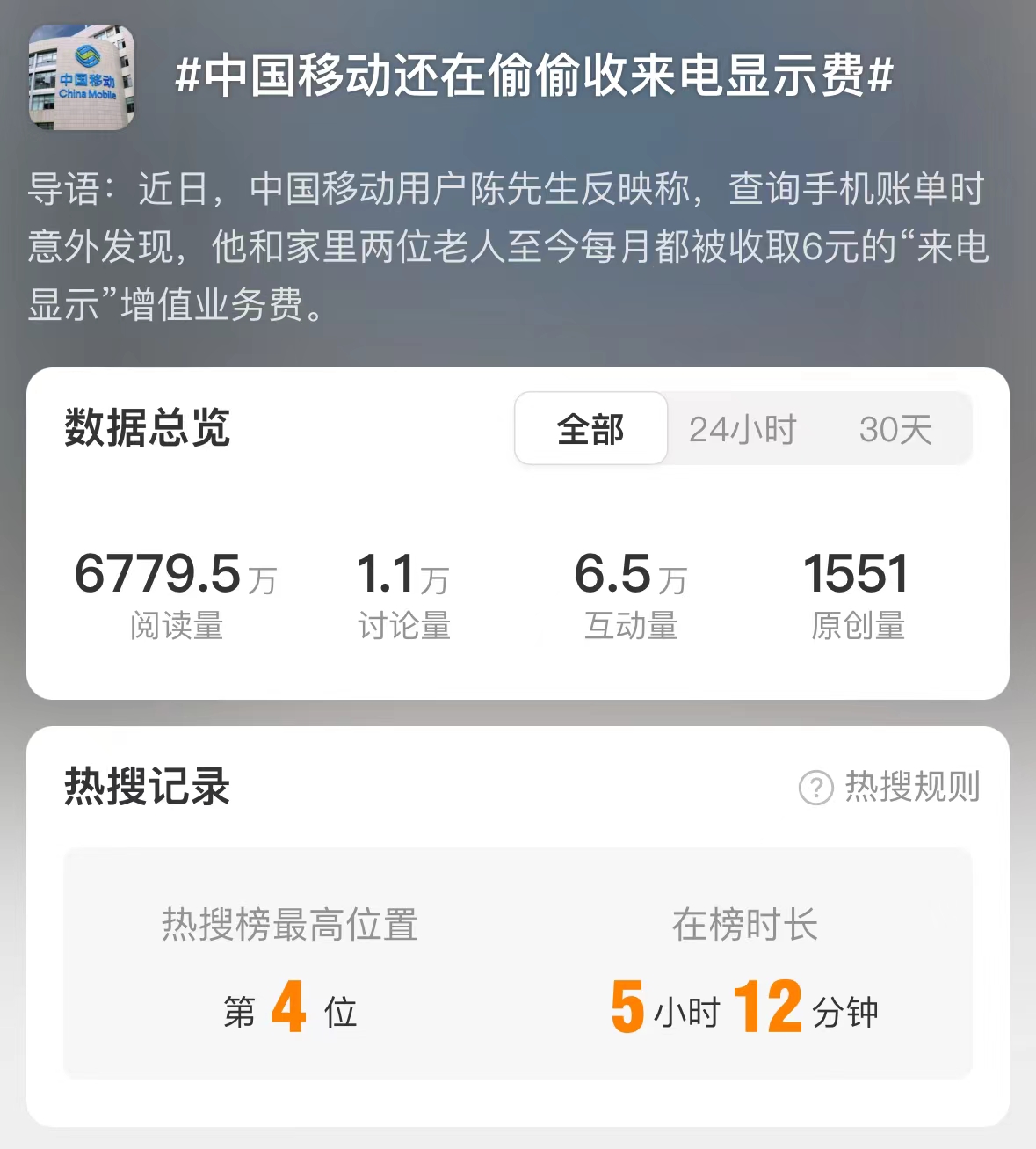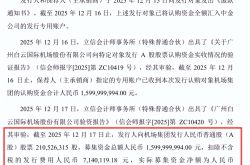Stealthily charging for caller ID, are operators still playing tricks with tariffs in 2024?
![]() 07/17 2024
07/17 2024
![]() 606
606
There are indeed many pitfalls in operators' value-added services.
In recent years, as mobile phones have become more prevalent in our lives, the corresponding operator package tariffs have also become a hot topic of public discussion, especially the frequent occurrence of "unreasonable charges," which has caused dissatisfaction among consumers.
Yesterday, the topic "China Mobile is still secretly charging for caller ID" trended on Weibo. According to LeiTech, this incident mainly concerns China Mobile charging the blogger's parents for caller ID service for the past eight years, amounting to a cumulative total of 576 yuan per user at a monthly fee of 6 yuan. The reason it sparked heated discussion is that the blogger was informed by customer service that the corresponding fees could not be refunded, which became the focus of public opinion.

(Source: Weibo Hot Search)
According to China Mobile's official statement, the sale of "caller ID" service has been stopped across the network since April 1, 2016. This means that the blogger has been charged for a service that has long been canceled for eight years, which is indeed puzzling.
After the incident escalated, China Mobile responded that the blogger's new and old packages have different tariffs, and therefore, the fees generated by the old package cannot be retroactively refunded. In other words, due to the change in service packages, the previously overcharged fees will not be refunded.
It must be said that although only China Mobile, China Unicom, China Telecom, and China Broadcasting Network are currently operating in mainland China, they have launched a vast number of packages for different cities, target groups, and usage patterns. Ordinary consumers may find it difficult to distinguish between the tariff standards of these packages, leading to increasing confusion in the services provided by operators, and the term "unreasonable charges" has become a divide between users and operators.
Upgrading packages is easy, but downgrading and retaining numbers is difficult
In fact, just like LeiTech, many netizens learned through this trending topic that the "caller ID" service has been canceled. However, the most bizarre aspect of the entire incident is why users are still being charged for this service even though it has been canceled.
"Caller ID" is actually a basic value-added service through which operators provide the called party with information such as the caller's number and location. Due to its basic nature, this service has been controversial for a long time, with many netizens believing that it should be provided by operators as part of their service and should not be charged extra. Amidst this controversy, China Mobile officially discontinued this service on April 1, 2016, but the "caller ID" service still exists, albeit as a default free item in new packages.

(Source: China Mobile APP)
In other words, the blogger's family's package was subscribed to before 2016 and has not been changed for many years, resulting in the continued charging of fees even after the service was canceled. Of course, China Mobile also stated that typically, after collecting monthly rental fees, users are notified of basic charges via SMS, and if there are any objections, they should immediately contact customer service.
However, the actual user of the package feedback by the blogger is an elderly family member, who may not prioritize SMS notifications, leading to this absurd incident.
But speaking of which, changes to packages have been a frequent source of unhappiness between operators and users in recent years. For example, many users choose "number retention packages," which only retain the minimum tariff and do not require data, SMS, or any additional services. The reason for doing so is that the number is tied to too many services that cannot be canceled, but the tariff is no longer cost-effective. Many netizens have reported that applying for "number retention packages" is not easy, as staff often persistently recommend more expensive new packages during the application process, causing user resentment.

(Source: China Mobile)
These issues have further exacerbated public dissatisfaction with operator tariff transparency and customer service. LeiTech's friend had to file a complaint with the Consumer Association after multiple unsuccessful attempts to downgrade their tariff before successfully obtaining the downgrade. These phenomena indicate that operators still have some areas where service is inadequate and not transparent.
Of course, there are still only a minority of consumers who know how to choose the right package for themselves or have a good understanding of the operator packages they are using. More friends often only discover the problem after being charged for a long time. Therefore, it is essential to be familiar with one's own package and understand the local operator's tariff standards and service models.
Operators have too many tariff tricks
In fact, not only China Mobile but also other operators have similar problems. For example, China Unicom and China Telecom have also been criticized by users for issues such as tariff opacity and difficulty in downgrading packages. These issues often spark heated discussions among netizens, but resolving them is not easy. In response, the Ministry of Industry and Information Technology (MIIT) has repeatedly issued documents requiring operators to improve service quality and ensure that user rights and interests are not violated. However, judging from the current effect, it still relies on users themselves to be vigilant.
The most common tricks employed by operators are complex packages and hidden charges. Simply put, operators usually design various complex packages that can be overwhelming for users to choose from. These packages often hide various additional fees, such as caller ID fees and ringtone fees, which users are charged for unknowingly. For example, LeiTech once discovered that they were automatically subscribed to a ringtone service, which cost 5 yuan per month, even though they had never used it. This hidden fee results in users paying extra without knowing it.

(Source: China Mobile)
Moreover, operators often automatically subscribe users to various value-added services, such as SMS monthly packages and data packages, without their knowledge. Users are still required to pay for these services even if they do not use them. Just like Mr. Chen in this incident, who was unknowingly charged for caller ID service for eight years without ever applying for it. This situation is prevalent among users, many of whom do not know they have been subscribed to these services.
Another issue mentioned earlier is the difficulty in downgrading tariffs, which is a common problem for users.
It is worth noting that in recent years, there have also been many "upgrade offer" package tricks. For example, sales personnel will analyze the problems with your current package, such as insufficient data or excessive phone bills, and suggest upgrading to a more favorable package. Taking LeiTech's real-life experience as an example, the basic monthly data package indeed only has 10GB, which is often used up, but the original package includes an additional 50GB of free data. However, sales personnel intentionally obscure the usage of the additional data package and urge LeiTech to subscribe to a more expensive package.
Many users have also reported that after subscribing to a "discounted" package, they discovered that the originally free caller ID service had become a paid item, costing 6 yuan per month. This situation makes users feel deceived.
It can only be said that, apart from a few malicious sales tactics and hidden fees, many "tricks" can be avoided by understanding our own tariff situation and package usage. If we have a good understanding of our package, we can avoid being deceived even if the salesperson is vague.
Countering operator tricks is not difficult
In the end, as consumers, we must think carefully and read the terms and conditions thoroughly when choosing, upgrading, or subscribing to value-added services to reduce the chances of being tricked from the outset. For example, when handling a business, we should carefully read the contract and service terms to understand all possible charges and conditions. Especially when signing a contract, we should carefully check whether there are any default subscriptions for value-added services and clearly indicate that we do not need these services.
More importantly, we should regularly check our mobile phone bills to ensure there are no unexplained charges. If we find anything unusual, we should promptly contact operator customer service for verification. For example, when reviewing the bill each month, we can record any unexplained charges and communicate with customer service to understand their origin. We should proactively check whether there are any value-added services activated on our account and cancel them if they are not needed. For example, we can use the operator's APP or customer service hotline to query all services on our account and cancel unnecessary value-added services.
Nowadays, operators all provide official apps where we can find our bill details and activated services. If we encounter unclear charges, we should not keep silent but have a sense of rights protection and promptly lodge a complaint with the operator. If necessary, we can report the situation to relevant departments such as the Consumer Association.

(Source: App Store)
However, if operators could achieve tariff transparency and open and fair services during the provision of services, many such incidents could be avoided. Take the trending caller ID fee incident as an example. If the operator had mentioned this point when promoting package upgrades, such situations might have been avoided.
Overall, this incident not only reflects consumers' limited understanding of operator packages, including the tariffs of the packages they are using, but also reflects operators' insufficiently proactive attitude in handling such incidents and their inadequate handling of unreasonable or outdated items. As consumers, we hope that operators can improve their transparency and responsibility to rebuild trust between operators and users. At the same time, we also hope that the MIIT can strengthen supervision of the telecommunications industry to ensure that operators comply with relevant laws and regulations and eliminate unreasonable and hidden charges.
Source: LeiTech





